Which of the following gives the best definition for absolutism?
A belief in one all-powerful god.
Someone who has total power over the people and their government.
A person who has control over one branch of government.
John Locke’s theory of a perfect government.
2. Someone who has total power over the people and their government.
How did the state of Massachusetts receive its name?
The indigenous Massachusetts nation that already resided here
From the town of Massachusetts in England
From the pilgrims stating the vast wilderness here was “massive”
Governor Massachusetts named the state after himself when it was first founded
1. The indigenous Massachusetts nation that already resided here
The Declaration of Independence does which of the following?
Guarantees free education for all people
Abolishes slavery
Declares every man's house is his castle
Declares that governments get their power from the consent of the people
4. Declares that governments get their power from the consent of the people
Which of the following parts of the Great Compromise was written into the Constitution?
Enslaved peoples were counted as 3/5th of the population
The Slave Trade ended
The national capital was moved to Washington D.C.
The president has two term limits
1. Enslaved peoples were counted as 3/5th of the population
What was so memorable about the end of George Washington’s presidency, which sparked a tradition among other Presidents?
Keeping the United States neutral in foreign affairs
Enforcing the laws of the United States
He decided to end his presidency after only two terms
Giving up all their wealth
3. He decided to end his presidency after only two terms
What made Haiti the most valuable colony in the Caribbean?
The natural beauty and rich minerals in the soil
The abundance of sugar cane plantations
The exotic birds that would be traded
The abundance of cotton and rice fields
2. The abundance of sugar cane plantations
Which colony is 26?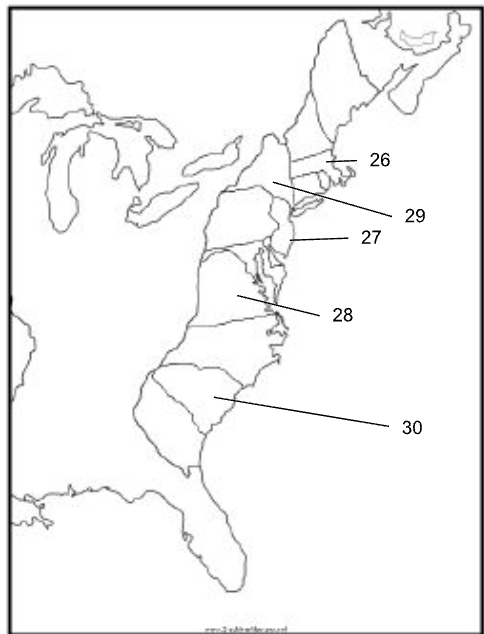
Massachusetts
First Amendment guarantees the right to:
a. Freedom of speech/religion
b. Due process
c. Right to bear arms
d. Self incrimination
a. Freedom of speech/religion
The main belief of the Enlightenment was that _____ could be used to combat ignorance, superstition, and tyranny and to build a better world.
Faith
Laws
Reason
All of the above
3. Reason
The Pilgrims and Puritans came to Massachusetts for what reason?
To make money
To have a new king
To have religious freedom
To look for gold
3. To have religious freedom
Which battle became the first battle of the American Revolution?
The Battle of Bunker Hill
The Battle of Breed’s Hill
The Battle of Medford
The Battle of Lexington and Concord
4. The Battle of Lexington and Concord
Balancing power between the federal government and state governments is called?
Dictatorship
Republic
Democracy
Federalism
4. Federalism
John Adams was an extremely unpopular President due, in part, to the passage of which Act?
Alien and Sedition Acts
Stamp Act
Friend Act
Jones Act
1. Alien and Sedition Acts
Which of the following ideas best influenced revolutions in Latin America?
Spread of Communism
Enlightenment ideas
The Spread of the Catholic Church
The ideas of President Thomas Jefferson
2. Enlightenment ideas
Which Colony is 29?
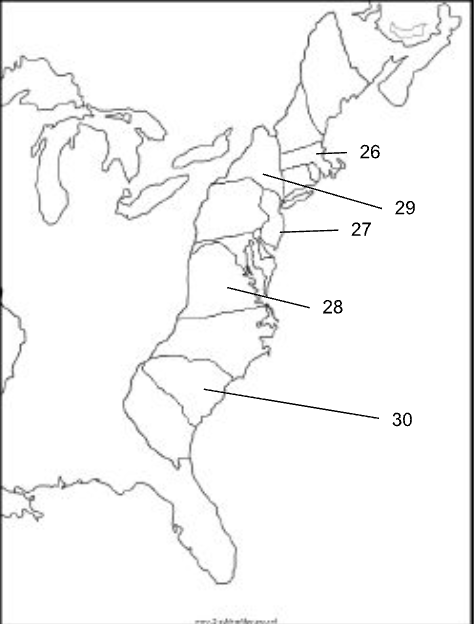
New York
The second Amendment guarantees the right to:
a. Due process
b. Double jeopardy
c. Right to bear arms
d. Quartering soldiers in citizens' homes
c. Right to bear arms
European colonization in the late 15th century was driven by powerful states financing exploration in hopes of:
Finding new trade routes to Asia
Controlling the Mediterranean Sea
Securing safe passage to Antarctica
Securing better access to the canals of Amsterdam
1. Finding new trade routes to Asia
What was the most disastrous consequence of contact between Europeans and the indigenous residents of Massachusetts?
The importation of English crops and animals
The introduction of Christianity
The introduction of smallpox, which killed ⅔ of the native population
The increase of conflict between England and France
3. The introduction of smallpox, which killed ⅔ of the native population
Revolutions took place in all of the following places in the early 1800s except where?
France
Haiti
Latin America
Ireland
4. Ireland
The Constitution’s three branches of government - legislative, executive, and judicial - can limit each other's power. What is this limit to power called?
Reviews and steadiness
Reviews and balances
Checks and steadiness
Checks and balances
4. Checks and balances
In order to solve the debt of the United States, what did Alexander Hamilton propose?
Moving the capital to a new city called Washington D.C.
Printing a significant amount of money
Creating a bank of the United States to manage the economy
Borrowing more money from European powers
3. Creating a bank of the United States to manage the economy
Which city is 33?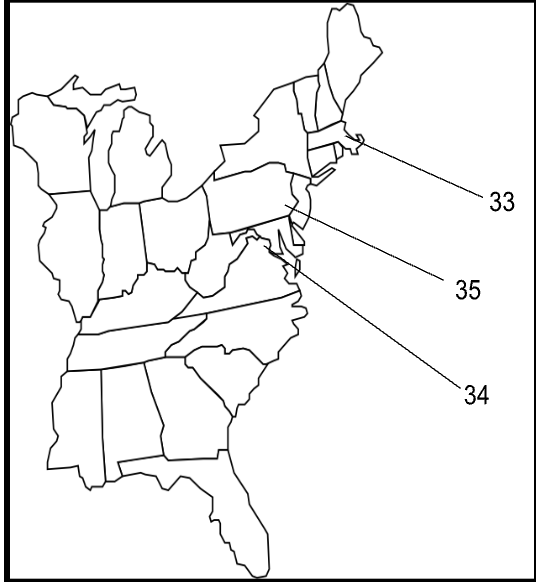
Boston
Which Colony is 27?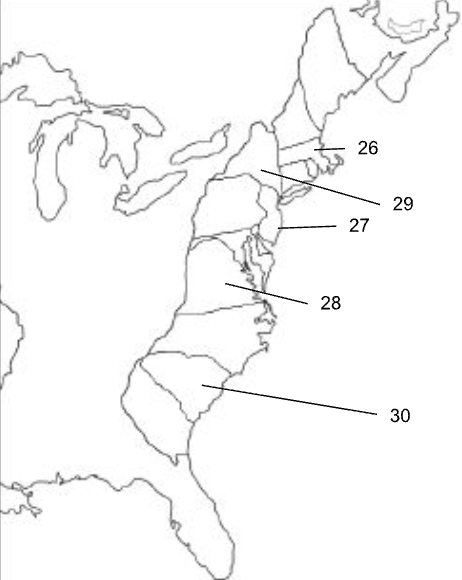
New Jersey
Fourth Amendment guarantees the right to:
a. Police cannot enter homes without a warrant
b. Right to Bear Arms
c. Any rights not outlined in the Constitution belong to the states
d. Safety from quartering
a. Police cannot enter homes without a warrant
Which of the following world events did Napoleon not affect?
The Latin American revolutions through his invasion of Spain.
Enlightenment thinking through his participation in salons.
The Haitian Revolution through his reintroduction of slavery practices.
The union of European countries due to the Napoleonic Wars.
2. Enlightenment thinking through his participation in salons.
After the French and Indian War, what did the American colonists and the British disagree over?
What the holiday celebrating victory in the war should be
Who should pay for the war’s debts
What to do with indigenous nations
How to negotiate a peace treaty with France
2. Who should pay for the war’s debts
What was the first national government in the United States after the American Revolution?
They adopted the Magna Carta
They created the Articles of Confederation
They adopted the Declaration of Independence
They created the Constitution
2. They created the Articles of Confederation
Why is the U.S. Constitution described as a living document?
The document was written on paper made from bamboo plants
The document can be changed based on the needs of the people
Government workers guard the document 24 hours per day
The document unites the past to the future
2. The document can be changed based on the needs of the people
Which region would the Democratic-Republicans most likely live?
the Northeast colonies
the Southern colonies
2. The Southern Colonies
Which city is 35?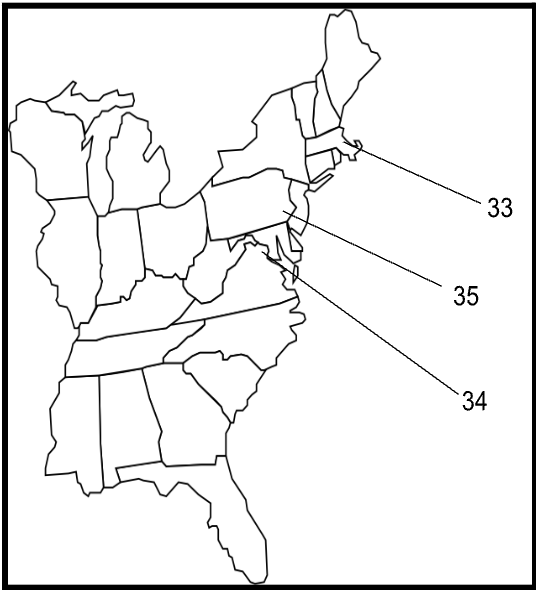
Philadelphia
Which Colony is 28? 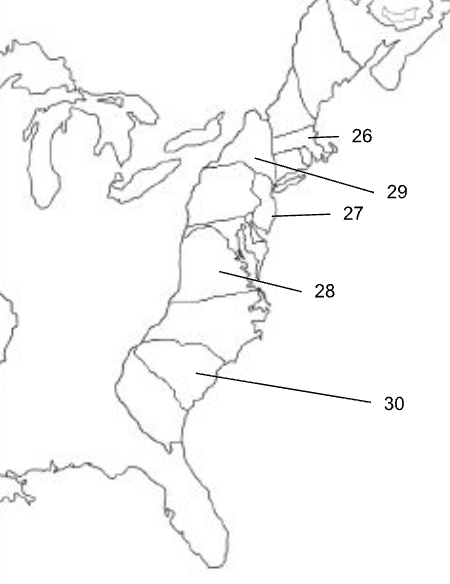
Virginia
Fifth Amendment guarantees the right to:
a. Any rights not outlined in the Constitution belong to the states
b. Due process
c. Freedom of speech
d. Trial by jury
b. Due process
Of the following, what was one way enslaved Africans would not protest their enslavement during the Middle Passage?
They would go on hunger strikes (refuse to eat)
They would throw themselves from the ship
They would stage revolts and take the ship over from their white captors
They would befriend the ships’ captains
4. They would befriend the ships’ captains
What event does the picture on the right best describe? 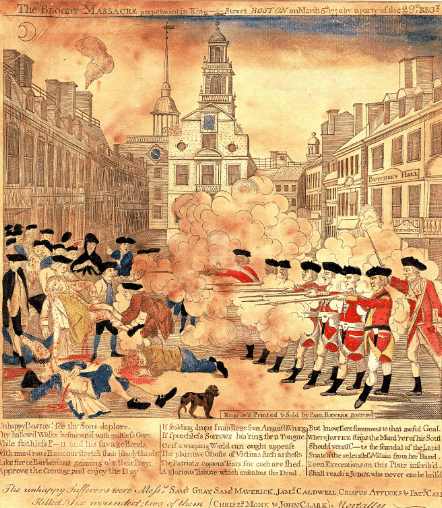
The Coercive Acts
The September Revolution
Shay’s Rebellion
The Boston Massacre
4. The Boston Massacre
Why was a Bill of Rights added to the Constitution of the United States?
The writers of the constitution did not trust the American people to know their own rights
The “natural rights” of United States citizens needed to be protected
To support the ideas of the French Revolution
Added with the hopes of later abolishing slavery
2. The “natural rights” of United States citizens needed to be protected
What are the two houses of Congress in the U.S. government?
House of Lords and House of Representatives
Parliament and the Senate
Houses of Commoners and Representatives
House of Representatives and the Senate
4. House of Representatives and the Senate
Which region would the Federalists most likely live?
The Northeast colonies
The Southern colonies
1. The Northeast colonies
Which city is 34? 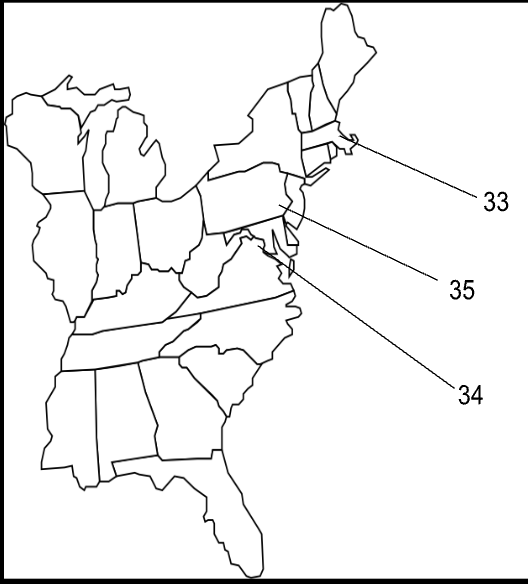
Washington D.C.
Which Colony is 30? 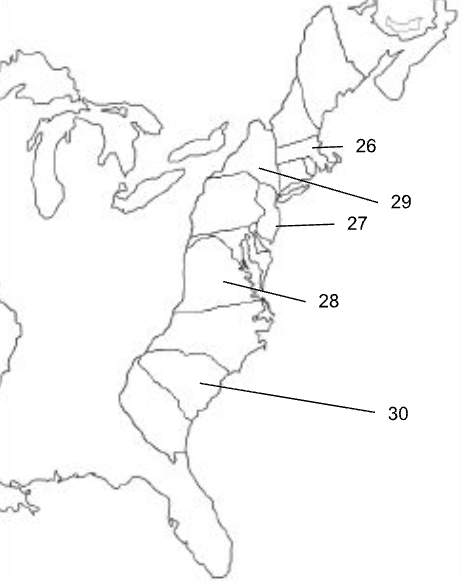
South Carolina
The Tenth Amendment guarantees the right to:
a. Due Process
b. Right to Bear Arms
c. Any rights not outlined in Constitution belong to the states
d. Safety from quartering
c. Any rights not outlined in the Constitution belong to the states